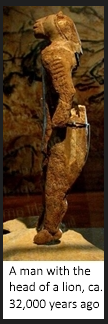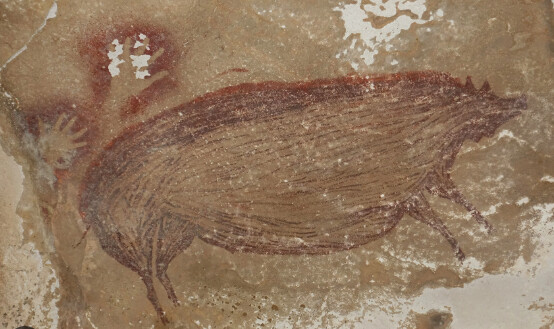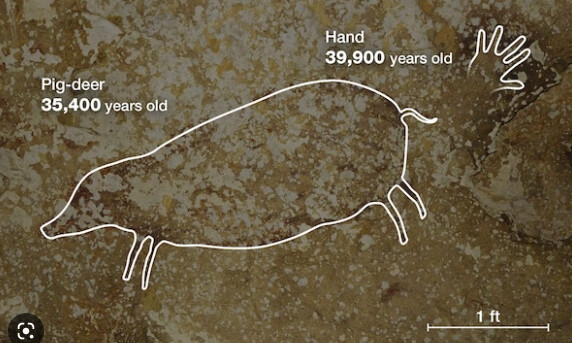looking for someone who can speak to the historical science in Yuval Harari’s Sapiens…
New to the forum and not sure where I should put this comment… feel free to delete
Welcome, @dawnrising!
I listened to it on audio a couple of years ago so I’m not probably the best person to respond, but do you have some specific questions you were looking to get answered? We have a few scientists around here that could certainly answer any purely science questions, regardless of having read the book or not, but certainly people who have read this book would have relevant insight also.
I think specifically the author speaks of many homo species and that sapiens killed all the others off and then made up religions to justify it. This kinda rocked my faith… So my questions are around the first part of that… is there evidence for many homo species living at the same time?
It has been a while since I read parts of that. Do you mean our Homo sapiens forbears killed off other homo species? Or did we simply out compete and in some cases absorb them? I imagine that would have happened especially as we settled in far flung places and different groups had time to evolve in different directions in response to different challenges. But I’m no scientist, just another person curious about our origins.
I have not read his book, and after reading the Wikipedia article about it, probably will not. I would be cautious taking his science too seriously, as he is trained as a historian, and seems to aspire to being an author, with little expertise in science. I would agree with Mark that it is more accurate to say Sapiens outcompeted rather than killed off the other species, though they definitely interacted as proven by the genes we carry from those encounters.
As to religion, that is difficult subject as to its origins. I think it is wrong to say it was invented to justify conflict, but it is definitely part of the glue that helps stick societies together.
Oh, and welcome to the forum! We love having new voices and hope to get to know you better as you feel comfortable sharing your story!
Harari has been severely criticized for numerous errors and the lack of sources in his book. Here’s one example:
On your specific questions,
- Many Homo species did, in fact, live at the same time. If we take ~300,000 years ago as the beginning of H. sapiens, six other hominins were living at the time: Neanderthal, Denisovan, H. floresiensis, H. naledi, H. luzonensis and possibly some late-surviving H. erectus.
- There’s zero evidence that sapiens killed off any of those species.
- Organized “religions” are a late development in human history. The earliest known temple complex is Gobekli Tepe (ca. 10,000 BC) in present-day Turkey. The idea that sapiens made up religions to justify wiping out previous hominins is a flight of fancy on Harari’s part.
Glib, lazy and shallow. Why we can’t have nice things.
Haha. Yeah. A couple of egregious errors are his claim that all apes and monkeys have vocal language and that “the decline of violence is due largely to the rise of the state.” The first is simply wrong, and the second is dangerously wrong. The rise of the state – and with it, the rise of kings and armies – unquestionably contributed to an increase in organized violence, i.e. war and bloodshed on a much larger scale than previously possible.
Seems to me the fault with the worst on my side is an inability to recognize a belief in anything beyond one’s own deliberative efforts … so unable to trust in anything when ones own efforts fall short. For the worst on your side are those who compete to hold as settled fact simplistic, poorly understood things … the more outlandish the better.
I’m not a fan of the my side-your side framing, but I hear what you’re saying.
Yeah I hear that, there is plenty in relation to which I’m pretty sure we on the same side. Frankly the whole tribalism thing gets tiresome. Especially no reason for me to tout them as very few non regard religion in the same way I do.
It also makes no sense to me (not that I’ve read the book). No humans would have had any inkling that they’d wiped out a species or had contributed to doing so. At most they would be aware that they’d killed members of some other band that looked kind of funny. Why would they invent religion specifically for that?
Making up stuff to justify the reality that everything people have was stolen from others murdered by their ancestors, is a certainly a good description of a great deal of human civilization. But such black and white ideological characterizations is also pretty endemic. The ideological hatred underlying these is downright poisonous. It is the communists and their manifesto which is the example of this which comes to my mind most readily.
So how do we combat these pathological tendencies? We do it by acknowledging that reality is more complicated than this, and contemptable as the justifications may be, it doesn’t mean there are no truths and commendable values to found in them as well.
Take another example… English society of previous centuries and idea of the gentleman. I am pretty sure that this very much has its origin in justifying a ruling class which conquered the people living there originally. But… it doesn’t mean that the ideals upheld by this gentlemanly image are of no value, …at least, not after we have pointed out the blatant hypocrisy to be found this society as well.
Thank you everyone… this helped me. Gratitude!
Hello! Brand spanking new to forum also. In fact, first forum ever. Not normally my bag, but really love the topics and thoughtful discussions I stumbled on here. Keen to come back and learn.
So many great topics! But I thought I’d dip my toe in here. In the interest of not drawing too hasty a conclusion on Harari, I’ve read Sapiens and also his book 21 Lessons for 21st Century. My takeaways were very different to some of the comments, but I’d love to hear some thoughts on one specific item.
Firstly, on “The Science/Is he a Scientist” - Harari I’d say very much sells himself as a Historian. One key take-away (in my own words and recollection, not his), was that everything in the past is technically thought of as history. But what the history books and historians take interest in, is essentially moments, events or processes of change. And so history is somewhat a study of change. Not trying to put words into authors mouth, but my own take-away 2 to 3 years on. Only stating as it relates to him being considered a scientist. He’s definitely not saying he’s an evolutionary biologist or anything.
But the real area of interest - I didn’t take away anything to do with Homo-Sapiens “killing off” other species. Or making up religion to validate doing so. What I feel like my biggest take-away from his work is Homo-Sapiens ability to tell stories.
If I were being asked to summarize his work - it would be a view or idea that Homo-Sapiens became the dominant species due to our ability to gather and co-operate in extremely large numbers. And the reason for this ability is our language and ability to tell stories.
An example that comes to mind might be putting 10,000 Chimps in the same place, likely resulting in some level of chaos. And least likely to have any co-operative behavior. But if you draw 50,000 humans together, you can easily get them to gather peacefully, and even co-operate by telling them they are all Red Sox or Yankee’s fans, or Americans, Christians etc. But perhaps extremely large numbers of humans also fight for the same reasons?
In short, I guess the idea was that you can’t tell a monkey that if he gives you his banana right now, you will give him 10 bananas tomorrow. But with humans, it’s different.
So I’d say my takeaway (accurate or not) was that this trait is what gives humans the ability to trust complete strangers, in a way other species just can’t. One could say that religion is a prime example of how humans co-operate flexibly with complete strangers, and even take action to help complete strangers. From what I drew from Sapiens, one could say that religion and other human cooperations (government etc) are essential to our evolutionary success.
So the question I was left with was;
- Is this (our ability to gather large numbers of homo-sapiens together, and cooperate using stories) indeed a biological or sociological trait that science has identified as being linked to our success as a species, as distinct from just language alone?
- If so, then is it an adaptive trait (ie. It seems I can imagine more intelligent story tellers being better adapted to survive).
I didn’t conclude this to be a negative. I did read the article and similar commentary about fact checking and critiques of “populist science”. Overall, whenever someone can get large numbers of people to enter the conversation and start thinking deeper I tend to not be too critical. Last thing I’d want to do is cancel someone who’s having an honest crack and getting conversation flowing.
Thanks and looking forward to digging further into some of these great forum topics!
Welcome to the Forum. I appreciate your spirited defense of Harari. You’re right that he presents himself as a historian, not a scientist, but historians are still held to account for getting their facts straight. Setting aside the religion question, my main criticism of Sapiens is that Harari leaves out facts that don’t fit his narrative. I’m not saying that’s intentional. In his defense, no one can read everything, and a lot has been discovered since the book was published in 2011. With that caveat, I’ll jump to your closing questions
Large-scale cooperation has been studied for a long time. Here’s a Google Scholar search on the term:
The most recent article directly addresses your questions: Large-scale cooperation in small-scale foraging societies.
Abstract
We present evidence that people in small-scale mobile hunter-gatherer societies cooperated in large numbers to produce collective goods. Foragers engaged in large-scale communal hunts and constructed shared capital facilities; they made shared investments in improving the local environment; and they participated in warfare, formed enduring alliances, and established trading networks. Large-scale collective action often played a crucial role in subsistence. The provision of public goods involved the cooperation of many individuals, so each person made only a small contribution. This evidence suggests that large-scale cooperation occurred in the Pleistocene societies that encompass most of human evolutionary history, and therefore it is unlikely that large-scale cooperation in Holocene food producing societies results from an evolved psychology shaped only in small-group interactions. Instead, large-scale human cooperation needs to be explained as an adaptation, likely rooted in distinctive features of human biology, grammatical language, increased cognitive ability, and cumulative cultural adaptation. (Bold type is mine and not in the original.)
I’ll try to unpack that quickly. Trade networks of 100 km appeared around 1 mil years ago with late H. erectus. This evidence long predates sapiens and implies both lessened aggression toward “strangers” and improved means of communication. By that, I mean erectus was physically capable of rudimentary speech, but advanced grammar and modern “language” still required hundreds of thousands of years to evolve before narrative storytelling was possible. (Dunbar even wrote an article connecting the control of fire to fireside “gossip” and the evolution of language.)
Between 130-100,000 years ago, trade networks suddenly expand to 300 km in Middle Stone Age (Pleistocene) Africa. Why? The likely explanation is a breakthrough in language, but it’s not coincidence that sapiens “globular brain” (the biological angle) and the evidence of symbolism from Blombos Cave in S. Africa appear at roughly the same time.
It wasn’t just language but “all of the above” that conspired to allow human cooperation on exponentially greater and greater scales. To sum up, large-scale cooperation has deep evolutionary roots that predate the Holocene invention of agriculture, temples, cities, states and governments.
My real problem with Harari’s book is that he accentuates the positive effects of large-scale human cooperation and ignores the negatives. Yes, the invention of agriculture allowed humanity to congregate in one spot on previously unimaginable scales. But every leap forward is accompanied by greater risk. Harari only tells one side of the story. Along with agriculture and appearance of cities and temples came the rise of armies, city-states, palace-temple economies that enslaved the poor and proto-empires that built ziggurats and declared their kings to be living gods.
That’s not to say government etc. is all bad. My point is that every human advance carries the potential for good or evil. Large-scale cooperation is no different. It can be used for human flourishing or for oppression. Our choice.
Thanks so much for the detailed reply and reference to some helpful articles/scholarship. The bolding on the abstract helped.
Large scale cooperation wasn’t necessarily new to me. But perhaps the unique aspect I hadn’t thought about or been taught before until Harari’s book was the “story telling” as a trait.
Instead, large-scale human cooperation needs to be explained as an adaptation, likely rooted in distinctive features of human biology, grammatical language, increased cognitive ability, and cumulative cultural adaptation.
What I’m hearing you say is that other older species of Homo-erectus showed traits of co-operation albeit less sophisticated. So cooperation was clearly happening without sophisticated language/stories.
I recall reading that evidence of early beliefs and faith can be found in bodies being buried in a particular orientation such as facing East. Has such evidence of “faith” practices been found in early homo-erectus or primarily just homo-sapiens?
In short - I wonder how far back we’ve found our awareness of a relationship to something beyond us.
Thanks once again for your thoughtful and detailed reply.
Exactly.
Evidence of spiritual beliefs and practices is notoriously hard to pin down in the archaeological record. I think burials with grave goods is the first indication of some kind of hope of an “afterlife,” though it’s impossible to say what that belief entailed for them. The earliest human burial is a 2.5-3.5-yr-old child around 78,000 years ago. The earliest known burial with grave goods is a 2-3 month old infant buried with a shell necklace about 74,000 years ago.
Other than similar burials with increasingly elaborate grave goods, there isn’t much archaeological evidence of spiritual beliefs until after the appearance of figurative art ~45-50,000 years ago. Then things like “Venus” fertility figurines and “fantastic creatures” like this lion-headed man start to show up, and cave paintings of animals in Sulawesi and Chauvet may have served in some sort of ritual for success in the hunt.




Amazing - thanks!! This kind of information helps reconcile some of the ideas of story and faith that goes very far back. It seems to me that there are likely ancestors to humans that have been found much earlier with evidence of a burial. Which alone might imply ritualistic or symbolic understanding. The question I was asking myself in Harari’s work, ultimately lead me via this thread and your comments to “Who first buried their dead?” - which suggests where symbolism, or some kind of practical understanding of past/present/future might have began.
I’ll leave further commentary to future forum posts as I’m sure it will get off topic to Harari’s work.
I appreciate your diligence in reply.
You bet! Fortunately (or unfortunately), you happened to stumble on my area of interest. A couple of quick caveats: Symbolism isn’t the same as even rudimentary spirituality. Ochre and shell beads as personal decoration started appearing around 100-120,000 yrs ago in Blombos Cave, S. Africa, and graphic rock etchings (hashmarks) shortly after that. So symbolism preceded human burials with grave goods by 25,000+ years, as far as we know now.
Understanding of past/present/future is a different question. That involves biology more than it does the evolution of grammar/language. (American Sign Language, for example, has no verb tenses.) The biological part is called “working memory,” which is primarily controlled by the executive function of the brain’s prefrontal cortex. Sapiens high forehead tells part of that story. Anyway, here’s a great, if somewhat dated, video that correlates working memory with the religious impulse. Food for thought. Last but not least, I’ll drop a link to the “condensed” version of my research on the subject.
Great talking to you. I’m definitely wandering off topic, but thanks for indulging me. Hope you stick around!

